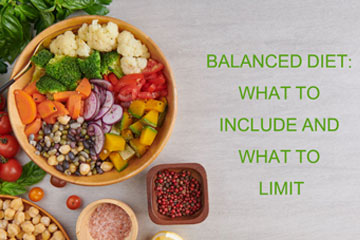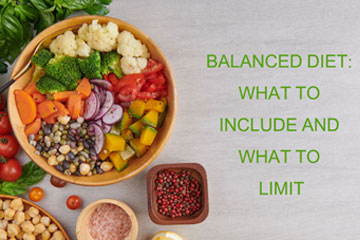
The key to a healthy, balanced diet is to ensure intake of the right amount of calories based on how active you are. It balances the energy you consume with the energy you use. It will contain a variety of foods such as fresh fruit, vegetables, starchy foods, protein-rich foods and some dairy foods.
To get started on your journey to a healthier lifestyle, here are the important foods you need include and avoid in a balanced diet:
What to Include in Your Diet
- Fresh Vegetables and Fruits: Two food groups that are essential in a balanced diet are fruits and vegetables. Fresh fruit and vegetables are significantly rich in minerals, antioxidants, plant protein, dietary fiber, and vitamins. Eat these foods in their raw state such as salads, fruits and vegetable juices which are healthier than cooking them. This will also make meal preparation easier. Eat at least five portions of fruit and vegetables every day. Try to eat a variety of vegetables – especially dark green, red, and orange vegetables (3 or more servings a day) – as this will provide different combinations of nutrients needed for your body to stay healthy.
- Whole Grains: Most of a person’s daily caloric intake comes from grains. The United States Department of Agriculture‘s (USDA) updated guidelines say that grains should make up only a quarter of a person’s plate. Grains have two subgroups: whole grains and refined grains.
Whole grains include all three parts of the grain – the bran, germ, and endosperm – and have less effect on a person’s blood sugar as the body breaks down whole grains slowly. Moreover, they tend to contain more fiber and protein than refined grains. Refined grains are processed, do not contain the three original components, and also tend to have less protein and fiber, which can cause blood sugar to spike. Make sure that at least half of the grains you eat are whole grains. Choose healthful whole grains such as quinoa, oats, brown rice, barley and buckwheat. - Protein: Protein plays a key role in ensuring the growth and maintenance of muscles and healthy bones and in the management of a healthy immune, circulatory, and nervous systems. Some nutritious protein choices include lean beef, pork, chicken, turkey, fish, beans, peas, legumes, nuts and seafood.
- Dairy and Fortified Soy Products: As a vital source of calcium, dairy products also provide other essential nutrients, including protein and vitamin D. The USDA recommends consuming low-fat version of dairy whenever possible. If a person is lactose intolerant, then they can opt for low-lactose or lactose-free products, or choose soy-based sources of calcium and other nutrients. Low-fat dairy and soy options include ricotta or cottage cheese, low-fat milk, yogurt and soy milk.
- Good Fats and Oils: Though too much fat can increase calories above what the body needs and may lead to weight gain, good fats and oils are essential for energy and cell health. Eat a moderate amount of fats that the body can’t naturally produce. Good fats also help absorb fat-soluble vitamins such as vitamins A, D, E, and K, and protect the cells from oxidative stress.
a. Consume Unsaturated Oils – such as vegetable oils and fish oils
b. Limit Saturated Oils – such as butter, cheese, and heavy cream
c. Avoid Trans Fats – fats used in many processed and premade foods
What to Limit
- Limit Salt, Sugar, and Processed Food: Reduce daily intake of salt or sodium to less than 1,500 mg. per day, especially if you are older than 50, or have hypertension, diabetes or chronic kidney disease. Likewise, restrict or eliminate processed foods, sodas and other sugar-added drinks that are high in calories and contain few or no nutrients as they contribute to weight gain, obesity and diabetes.
The key to maintaining a balanced diet is to eat a variety of foods from different food groups. This will help your body get the right amount of nutrients to function effectively.

